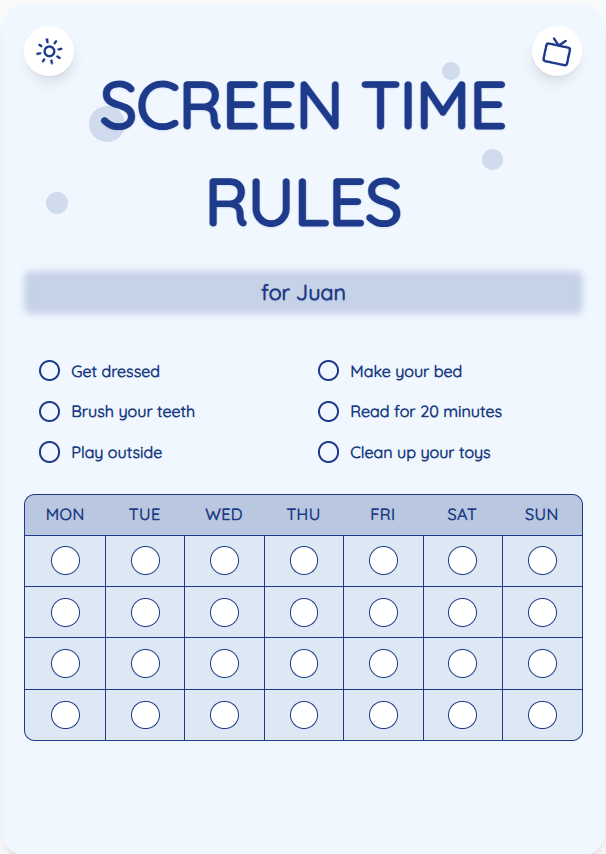Unveiling the Effects of Screen Time on Your Child's Brain
In today's digital age, children are exposed to screens more than ever before. As a parent, understanding how screen time affects your child's brain is crucial for their overall well-being and development. Let's delve into the impact of excessive screen time on young minds and explore actionable solutions to promote healthy screen habits.
See What Your Screen Time Chart Will Look Like
Here's an example of a beautiful, customizable screen time rules chart you can create for your family

The Brain Development in Children and Screen Time
Children's brains undergo rapid development during early years, making them particularly vulnerable to the effects of screen time. Excessive screen exposure has been linked to issues such as decreased attention span, poor sleep quality, and delayed cognitive development. Limiting screen time is essential to support healthy brain growth and function in children.
Screen Time Guidelines for Different Age Groups
It's important to establish age-appropriate screen time limits for children. Younger kids require less screen exposure compared to older ones. ScreenTimeRules.com offers customizable screen time charts that can help you set realistic limits based on your child's age and individual needs.
Put These Tips Into Action
Create a custom chart to implement these strategies with your child
Effects of Screen Time on Cognitive Skills and Emotional Health
Research suggests that excessive screen time can hinder the development of cognitive skills such as problem-solving and social interactions. Moreover, prolonged screen use can impact children's emotional health, leading to mood swings and behavioral issues. By managing screen time effectively, parents can promote better cognitive and emotional well-being in their children.
Practical Tips for Success
- Create a daily screen time schedule for your child and stick to it.
- Encourage outdoor activities and hands-on play as alternatives to screen time.
- Engage in screen time activities together to monitor content and promote bonding.
- Establish screen-free zones in the house, such as bedrooms and meal areas.
Frequently Asked Questions
How much screen time is considered excessive for children?
The American Academy of Pediatrics recommends limiting screen time to 1 hour per day for children aged 2-5 and promoting high-quality, educational content for older children.
Can educational apps and games mitigate the negative effects of screen time?
While educational apps can be beneficial, moderation is key. Ensure that screen time is balanced with other activities like reading, physical play, and social interactions.
How can I handle resistance from my child when enforcing screen time limits?
Communicate openly with your child about the reasons for setting limits. Consistency, positive reinforcement, and leading by example are effective strategies to address resistance.
Understanding how screen time impacts your child's brain is the first step towards fostering a healthy digital environment. By implementing practical tips and utilizing tools like screen time charts from ScreenTimeRules.com, you can empower your child to develop balanced screen habits and thrive in the digital age.
Ready to Transform Your Family's Screen Time?
Join thousands of parents who have successfully managed screen time with our customizable charts.
